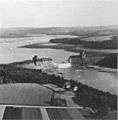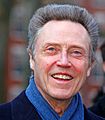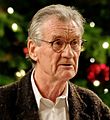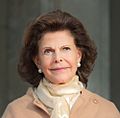1943 facts for kids
| Millennium: | 2nd millennium |
|---|---|
| Centuries: | 19th century – 20th century – 21st century |
| Decades: | 1910s 1920s 1930s – 1940s – 1950s 1960s 1970s |
| Years: | 1940 1941 1942 – 1943 – 1944 1945 1946 |
The year 1943 was a very important time during World War II. Many major battles happened, and the war started to turn in favor of the Allied powers. Leaders from different countries met to plan how to win the war. It was also a year when new technologies were developed and many famous people were born or passed away.
Contents
Key Events of 1943
January to March: Turning Points
- January 11 – The United States and United Kingdom gave up their special rights in China. This was a step towards China becoming more independent.
- January 14 – Franklin D. Roosevelt became the first President of the United States to travel by airplane while in office. He flew from Miami, Florida to Morocco to meet with Winston Churchill and talk about World War II.
- January 15 – In World War II, Japanese forces were pushed out of Guadalcanal. This was a big victory for the Allies in the Pacific.
- January 15 – The Pentagon, which is the world's largest office building, was officially opened in Arlington, Virginia. It's the headquarters for the U.S. Department of Defense.
- January 18 – Soviet officials announced that they had broken the Wehrmacht's long siege of Leningrad. This was a huge relief for the city's people.
- January 18 – The Jews in the Warsaw Ghetto bravely started their first fight against the Nazis, known as the Warsaw Ghetto Uprising.
- January 23 – British forces captured Tripoli from the Nazis. This was an important step in the North African campaign.
- January 24 – Franklin D. Roosevelt and Winston Churchill finished a big meeting in Casablanca, where they discussed war plans.
- February 2 – In Russia, the fierce Battle of Stalingrad finally ended. The German army surrendered, which was a major defeat for Germany and a turning point in the war.
- February 7 – In the United States, the government announced that people would need special coupons to buy shoes, as part of wartime rationing.
- February 11 – General Dwight D. Eisenhower was chosen to lead all the Allied armies in Europe.
- February 14 – World War II: The city of Rostov, Russia was freed from German control.
- February 14 – In the Battle of the Kasserine Pass, German General Erwin Rommel attacked Allied forces in Tunisia. This was the United States' first big battle defeat in the war.
- February 18 – The Nazis arrested members of the White Rose movement, a group of students who bravely spoke out against them.
- February 22 – Members of the White Rose movement were sadly executed in Nazi Germany.
- February 28 – In a daring mission called Operation Gunnerside, six Norwegians successfully attacked a heavy water plant in Vemork, Norway. This was important because heavy water could be used to make atomic bombs.
- March 2 – World War II: In the Battle of the Bismarck Sea, United States and Australian forces sank many Japanese ships.
- March 3 – A terrible crush at Bethnal Green tube station in London killed 173 people who were trying to get into an air-raid shelter.
- March 13 – The Holocaust: German forces completely cleared out the Jewish ghetto in Kraków, forcing many people away.
April to June: Continued Fighting
- May 11 – World War II: American troops invaded Attu Island in the Aleutian Islands to remove Japanese forces who had taken it over.
- May 13 – World War II: German and Italian troops in North Africa surrendered to Allied forces. This ended the war in North Africa.
- May 16 – World War II: The famous Dambuster Raids took place. RAF 617 Squadron bombed German dams, causing a lot of damage.
- May 16 – The Holocaust: The Warsaw Ghetto Uprising officially ended. The Jewish fighters had bravely resisted for weeks.
- May 24 – The Holocaust: Josef Mengele became the Chief Medical Officer in Auschwitz, a terrible concentration camp.
- June 4 – There was a military coup in Argentina, and Ramón Castillo was removed from power.
July to September: Major Allied Advances
- July 5 – World War II: The Battle of Kursk began. This was the largest tank battle in history.
- July 10 – World War II: The Allies began their invasion of Axis-controlled Europe by landing on the island of Sicily, off mainland Italy. This was a huge step towards taking back Europe.
- July 19 – World War II: Rome, the capital of Italy, was bombed by the Allies for the first time in the war.
- July 24 – World War II: Operation Gomorrah began. British and Canadian planes bombed Hamburg at night, and American planes bombed it during the day. This operation caused massive destruction and many deaths.
- July 25 – In Italy, Benito Mussolini, the leader, was arrested, and power was given to General Pietro Badoglio. This was a big change for Italy.
- July 27 – World War II: USSR leader Joseph Stalin issued a very strict order, saying that anyone who ran away from their positions without orders would be killed.
- August 17 – World War II: The US 7th Army and the British 8th Army met in Messina, Italy, completing the Allied conquest of Sicily.
- August 29 – World War II: Germany took over the Danish government after it refused to stop strikes and disturbances.
- September 3 – World War II: Allied forces, led by Bernard Montgomery, invaded mainland Italy for the first time in the war.
- September 8 – World War II: United States General Dwight D. Eisenhower announced that Italy had surrendered to the Allies.
October to December: War Continues, New Nations Emerge
- October 13 – World War II: The new government of Italy officially joined the Allies and declared war on Germany.
- November 1 – World War II: U.S. Marines landed on Bougainville in the Solomon Islands as part of Operation Goodtime.
- November 15 – Porajmos: German SS leader Heinrich Himmler ordered that Gypsies and "part-Gypsies" should be treated like Jews and sent to concentration camps.
- November 16 – World War II: American bombers flew from Britain to strike a power facility and heavy water factory in Vemork, Norway, which was controlled by Germany.
- November 20 – World War II: The Battle of Tarawa began. U.S. Marines landed on Tarawa and Makin atolls and faced heavy fire from Japanese guns.
- November 22 – World War II: U.S. President Franklin D. Roosevelt, British Prime Minister Winston Churchill, and Chinese leader Chiang Kai-shek met in Cairo, Egypt, to plan how to defeat Japan.
- November 22 – Lebanon gained its independence from France, becoming its own country.
- November 28 – World War II: The Tehran Conference took place. Franklin D. Roosevelt, Winston Churchill, and Joseph Stalin met in Tehran to discuss war plans, including the D-Day invasion planned for 1944.
- December 4 – World War II: In Yugoslavia, resistance leader Josip Broz Tito announced a temporary democratic government.
- December 4 – The Great Depression officially ended in the United States. Unemployment dropped quickly because of jobs created by World War II.
- December 24 – World War II: U.S. General Dwight D. Eisenhower became the supreme Allied commander, leading all Allied forces.
- December 30 – Subhash Chandra Bose raised the flag of Indian independence at Port Blair.
- The Colossus computer was developed by the British to help break German secret codes.
Famous People Born in 1943
- January 7 - Sadako Sasaki, a Japanese girl who became a symbol of peace after the atomic bomb.
- January 24 - Sharon Tate, an American actress.
- February 25 – George Harrison, a famous English musician from The Beatles.
- March 9 – Bobby Fischer, a brilliant American-born Icelandic chess player.
- March 19 - Mario Monti, a former Prime Minister of Italy.
- March 29 - John Major, a former Prime Minister of the United Kingdom.
- March 29 – Eric Idle, an English actor and comedian, known from Monty Python.
- March 31 – Christopher Walken, a well-known American actor.
- May 5 - Michael Palin, a British actor, comedian, and writer, also from Monty Python.
- August 17 – Robert De Niro, a very famous American actor.
- September 29 - Lech Wałęsa, a former President of Poland.
- December 11 – John Kerry, an American politician and former Secretary of State.
- December 23 - Queen Silvia of Sweden, the Queen of Sweden.
- December 31 - John Denver, a popular American singer.
- December 31 - Ben Kingsley, a British actor.
Notable People Who Passed Away in 1943
- January 5 – George Washington Carver, an American educator and scientist who made many discoveries about plants.
- January 7 – Nikola Tesla, a brilliant physicist and inventor.
- February 14 – David Hilbert, an important mathematician.
- March 28 – Sergei Rachmaninoff, a famous Russian composer and pianist.
- April 18 – Isoroku Yamamoto, a Japanese admiral during World War II.
- May 26 – Edsel Ford, the son of Henry Ford and a leader in the Ford Motor Company.
- August 28 – King Boris III of Bulgaria.
- October 19 – Camille Claudel, a French sculptor.
Movies and Music
- The classic movie Casablanca was released.
- Popular songs included:
- "As Time Goes By" by Rudy Vallée
- "Paper Doll" by Mills Brothers
- "You'll Never Know" by Dick Haymes
New Books Published
- Adam of the Road by Elizabeth Gray Vining
- The Fountainhead by Ayn Rand
- Gremlins by Roald Dahl
- The Little Prince by Antoine de Saint-Exupéry
- A Tree Grows in Brooklyn by Betty Smith
Nobel Prizes
- Henrik Dam and Edward Adelbert Doisy won the Nobel Prize in Physiology or Medicine for discovering Vitamin K.
Images for kids
-
A low level attack on a Japanese ship during the Battle of the Bismarck Sea
-
This photograph, from the Stroop Report, shows captured fighters in the Warsaw Ghetto Uprising.
-
The Möhne Dam breached following Operation Chastise, carried out by the "Dambusters" of the RAF.
-
The U.S. Liberty ship SS Robert Rowan explodes during the Allied invasion of Sicily, July 11, 1943.
-
Mackenzie King, Franklin D. Roosevelt and Winston Churchill at the 1943 Quebec Conference.
-
Chiang Kai-shek, Franklin D. Roosevelt and Winston Churchill at the Cairo Conference, November 25, 1943.
-
The first Lebanese flag hand drawn and signed by the deputies of the Lebanese parliament, November 11, 1943. The French Mandate ends and Lebanon gains independence in November 1943.
-
Joseph Stalin, Franklin D. Roosevelt and Winston Churchill on the verandah of the Soviet Embassy in Tehran during the Tehran Conference
See also
 In Spanish: 1943 para niños
In Spanish: 1943 para niños



























